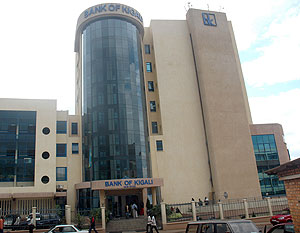ABIDJAN – Rwanda’s move to create a private sector export led economy has received an African Development Bank (AfDB) boost following the announcement by the Bank that it will expand its private sector operations. Tim Turner, the Director of Private Sector Development at AfDB, told Business Times that the Bank intends to inject $50- 60 million in private sector projects within two years beginning 2010.


ABIDJAN – Rwanda’s move to create a private sector export led economy has received an African Development Bank (AfDB) boost following the announcement by the Bank that it will expand its private sector operations.
Tim Turner, the Director of Private Sector Development at AfDB, told Business Times that the Bank intends to inject $50- 60 million in private sector projects within two years beginning 2010.
"Currently we have a very small portfolio-we are going to increase it very dramatically. We hope to complete the current projects within the next twelve months,” Turner said an exclusive interview last week.
This was said during the annual meetings of the Bank that saw shareholders of the Bank approve tripling of the Bank’s capital resources to nearly $100 billion.
With the capital increase, the bank says it will be able to sustain a higher level of lending, including to Rwanda’s nascent private sector.
The initial beneficiaries will be Rwanda’s Development Bank (BRD) and Bank of Kigali with which the Bank intends to issue a line of credit for Small and Medium Enterprises (SMEs).
The Bank will also inject capital into Cimerwa, Rwanda’s largest cement maker that is currently sourcing for cash to finance the construction of its new factory to cater for the increasing demand for cement.
Contour Global, a company that is engaged in the project of extracting Methane gas at Lake Kivu is also among the beneficiaries.
The Bank says that strategically focusing on the manufacturing, energy, and the financing sectors will directly address bottlenecks to improving enterprise competitiveness and encourage private sector participation in infrastructure.
In addition to financing projects, the Bank says it will engage more in technical capacity building of the private sector.
Referring to his recent visit to the country, Turner also observed that the Bank’s efforts will be hugely complemented by government’s commitment to create an enabling environment for business.
"Rwanda has moved from becoming the most difficult place to do business, to the easiest place to do business,” he said referring to the World Bank’s "2010 Doing Business” that ranked Rwanda as the world’s top reformer in creating a business-friendly environment.
Currently the AfDB’s approximately $500 million portfolio mainly covers infrastructure development, agriculture, and higher education, science and technology.
John Rwangombwa, the Finance Minister says that while government has witnessed tremendous improvements in the Bank’s Portfolio, it believes there is still room for improvement.
Government would like to see the Bank more involved in private sector development to foster its growth as the engine of economic growth, the official says.
"We want to see increase in the overall envelope we are getting but also more participation of financing to the private sector,” he added.
In 2009, private sector operations of AfDB reached a record high of about $2 billion for 32 projects in Africa.
Ends


